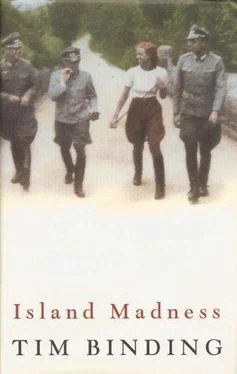Tim Binding - Island Madness
Здесь есть возможность читать онлайн «Tim Binding - Island Madness» весь текст электронной книги совершенно бесплатно (целиком полную версию без сокращений). В некоторых случаях можно слушать аудио, скачать через торрент в формате fb2 и присутствует краткое содержание. Город: Toronto, Год выпуска: 1999, ISBN: 1999, Издательство: Doubleday Canada, Жанр: Историческая проза, Триллер, на английском языке. Описание произведения, (предисловие) а так же отзывы посетителей доступны на портале библиотеки ЛибКат.
- Название:Island Madness
- Автор:
- Издательство:Doubleday Canada
- Жанр:
- Год:1999
- Город:Toronto
- ISBN:9780385258388
- Рейтинг книги:3 / 5. Голосов: 1
-
Избранное:Добавить в избранное
- Отзывы:
-
Ваша оценка:
- 60
- 1
- 2
- 3
- 4
- 5
Island Madness: краткое содержание, описание и аннотация
Предлагаем к чтению аннотацию, описание, краткое содержание или предисловие (зависит от того, что написал сам автор книги «Island Madness»). Если вы не нашли необходимую информацию о книге — напишите в комментариях, мы постараемся отыскать её.
,
and
—albeit with suspiciously jackbooted pirates. But when a young local woman is found murdered, both the islanders and the occupiers are forced to acknowledge that this most civilized of wars conceals a struggle that is darker and more bitter than anyone cares to recognize.
Island Madness — читать онлайн бесплатно полную книгу (весь текст) целиком
Ниже представлен текст книги, разбитый по страницам. Система сохранения места последней прочитанной страницы, позволяет с удобством читать онлайн бесплатно книгу «Island Madness», без необходимости каждый раз заново искать на чём Вы остановились. Поставьте закладку, и сможете в любой момент перейти на страницу, на которой закончили чтение.
Интервал:
Закладка:
The Captain changed gear and raced along Grange Road and the great houses of authority that hid behind the evergreen hedges and wrought-iron gates, then turned left down Queen’s Road, sounding his horn at a weary troop of shuffling infantrymen who stood back against the stone wall as they flashed past, the Captain acknowledging their courtesy, Veronica staring ahead, pretending that she was invisible to their whistling barrack-room taunts. At the crossroads he plunged over, hardly bothering to look left or right, taking the dog-leg of Prince Albert’s Road with wheels squealing. Once through the bend he pushed back the hem of her dress high over her bare knee, accelerating into the straight. She closed her eyes. She knew where they were going. It was not the quickest way, but it allowed him speed. It fed his batteries, and if there was one thing the Captain liked, it was to be fully charged up. At the end of the road he swung the car quickly to the right. She leant into him hard and stayed pressed up against him, and they turned once more, into the steep narrow streel, where halfway down he parked the car in a overgrown siding off Val Fleury Close, safe from prying eyes. She unbuttoned the flap to his pocket and eased in her hand. The key lay at the bottom, long and cold. She took it out and held it up to the light. It surprised her. It was shiny and new.
“What happened to the old one?” she asked.
The Captain took it from her, smiling, and put it back in his pocket, patting its shape through the flap. He said nothing.
The car rides and cold-weather picnics had lasted a week. Then, the following Monday when she had plumped down beside him, removed her hat, straightened her dress and asked, “Where to today?” Zep had turned the key, rewed the engine and had announced, “A surprise.” He had driven around for ten minutes, then, turning down Hauteville, had parked by Vktor Hugo’s house with its scrolled plaque set inside the wall.
“I thought I would give you a guided tour of the premises. You have never been?”
She had never been. What on earth would she want to go in there for?
“I’m not a great one for visiting museums.”
“No matter. It is not what we came for.”
“Game for?” she asked, though she knew well enough, had known it with sinking heart the moment he had uttered those words, and though it came as no great shock, what it was he expected from her, what he would always expect, there was a brief flicker of hope, when he leaped out and walked round to open the passenger door, bowing in that exaggerated manner, a greenhouse orchid produced from behind his back, that he had planned a small surprise for her, something intimate, unusual, which indeed he but only as to the placing of the old, familiar event. “From the had, Major’s desk,” he smirked once they were standing in the dark and peculiarly quiet hall, waving the key triumphantly in the dusty air as if the Major were a schoolmaster and he the prankish boy.
“What are we doing here?” she whispered, blushing at her own unconvincing naivety, and the Captain, laughing, pulled her to him and running his finger in between the rim of her collar and the damp flesh of her neck, replied, “There is no need to whisper, Veronica. We can make as much noise as we choose,” and with that started to lead her through the rooms, his hands clasped behind his back, her holding on to them like in some silly party game, the Captain releasing her now and again, like a man might let loose the slip of his dog leash, while she ran her fingers over the surface of some long gilt frame, or traced the design on some silver brocade, marvelling at the heavy shine that made every artefact appear so deep, so endless, before pulling her back en route to their destination. Finally they reached the third floor and a room entombed with dark, somnambulant tapestries, and in the centre, mounted on a pedestal, shrouded like some dormant chrysalis, stood an enormous bed. She’d seen smaller vegetable plots.
“Built for Garibaldi,” he said proudly.
Another name Veronica did not recognize.
“The father of Italy,” he told her, walking her towards it. “The only man famous for inventing something that has not worked. This bed was made specially for him.”
“Big, was he?” she offered facetiously, nervous now to be enclosed in this heavy darkened house with this restlessly demanding man. “Or did he move about a lot?”
The Captain refused to laugh.
“He never arrived to use it,” he said, pulling back the cover. On an embroidered pillow lay a bottle of champagne and two glasses. “No one has ever used it. Until now.”
Veronica had wondered if that was true, wondered whether the Captain had not entertained a host of girls here.
“What, not even Molly?”
The Captain looked surprised.
“Molly? Molly would want to move in, so she could boast about it.”
It was the first time since that time in the surgery that her name had come up. She had been the reason for the clandestine nature of these meetings, at least that was what she told herself. She didn’t see much of Molly these days. Molly had pulled out of the amateur dramatics the same time they’d found Isobel stuffed down that shaft, just when they had nearly completed preparations for their spring variety show. Not one but two girls short, Mrs H. had complained! It sounded especially callous coming from her, but it was true. It was going to be something special this time too, the first time she was taking the lead. The Captain coughed and stood waiting. She made one attempt at decency.
“What about Mrs Hallivand? I wouldn’t like her to come barging in.”
“She comes only in the mornings,” the Captain promised her. “No one will see. The afternoons will be ours alone to enjoy.”
And so they had. Starting in that entombed bedroom, within the week they had laid their intermittent claim throughout nearly the whole house, aping the habits of an ill-remembered aristocracy, wandering from room to room arm in arm like some landed couple viewing their priceless heirlooms, drinking champagne out of Venetian cut glass, opening shutters, closing doors, visiting every room save one at the ground level which was permanently locked and no trace of the key to be found, but no matter, there was still the thrill of sex on cordoned chaises longues or wrapped up in fifteenth-century tapestries and best of all naked up in the Eyrie, looking down over the convict island and the captured sea. How quickly the afternoons had become a fixture of their lives, as regular as the island’s motorcycle patrols, transforming this dead mausoleum into a palace of their possession, to dispose of as they saw fit, their occupation metamorphosed overnight from a single to a perpetual act, stretching like elastic both back and forward in time, creating its own history, obliterating all precedents. Where routine is concerned, there is no other history; it has always been thus. And it was in these surroundings that she began to learn the nature of the Captain’s captivity too, not a declaration of hopeless love (eternal or otherwise would have been welcome), no, he did not deliver that wishful confession, but instead voiced the frustrating limits of his meagre authority, his petty ambition and his fitful jealousy of uniforms other than his own. He did not vouchsafe matters of state, secrets a seductive spy might have elicited from her carefolly chosen lover, nor did these revelations occur after their coupling, for after the sex (and he was relentless in that respect, like a machine, once, twice, even three times in rapid succession), like so many men, he was eager to return to the mechanics of his restrictive male life, but rather these revelations occurred beforehand, while they made themselves at home, as he tried to mask his tumescent need by trivial and domestic conversation, a deception embarked upon not in recognition of Veronica’s sensibilities, but aired to convince himself that though he required that which she carried within and without her body, it was, as the matters he began to describe, a light, inconsequential thing, of no more consequence than which tie he might choose for an afternoon’s petrol-defiant motoring. And so he spoke in idle earnest, hardly bothering to hear her reply, a nod, a squeeze of the hand, a murmur sufficed, as he followed his wandering thoughts as a travelier might follow one of the hidden water lanes, hypnotized by their babbling murmur and aimless direction, not appreciating where they might be leading, and to begin with, to be sure they had led nowhere but those ruthless yet renascent bouts of intercourse, from which she left tired yet triumphant. But as the afternoons passed, and the conversations resumed day after day, as compulsive as some serial in a woman’s weekly magazine, he absorbed those sighs and gestures of unspoken understanding and began to recognize a part of him in her, just as while listening she became aware of a part of her within him. And because he knew he must not and could not talk of the island and its military burdens, he guarded against such indiscretions by leading her up the gravel drive to the Villa and all the intrigues that ran within its walls, the various jealousies, the indiscretions, the foolish love affairs, the tempers on the stairs. She has learnt of the Villa’s habits and the inequality therein; his own cramped bedroom overlooking the concrete coal sheds, compared to the Major’s bow-windowed chamber and its splendid view of the sea. She has learnt of Bohde and his compulsive and unnecessary greed; his obsessive sunbathing on the roof with young men from the Kriegsmarine; the way he comes back from the newspaper office with printer’s ink on his hands, leaving the finger marks of his trade on armchairs and balustrades where they can be picked up by the more fastidious lodgers. She has learnt about Molly’s relentless determination, the most singular woman he has ever met, the Captain confessed, her rare beauty setting her apart from the rest of her race, but so desperate to become official that she has attached herself to his uniform as if she were its most coveted decoration, to be paraded up and down before the ranks of his peers. To begin with he enjoyed these public exhibitions as much as Molly, delighting as his fellow officers cursed his good fortune, but over the months he has come to realize that these performances incite nothing but envy, particularly amongst his superiors. There are many who would like to strip him of this lush award and pin it to their own libidinous chest, and to his horror he has beginning to understand that there are those here who have the power to engineer it. She has learnt of the Villa’s comfort and its claustrophobia, the nights of desultory conversation and depressive drinking, the petty disagreements, the endless quarrels over hot water, the thefts of spoons and cutlery and china figurines which he suspects Albert of carrying out on behalf of Mrs Hallivand, not such an upright woman as everyone supposed, he suggested. Veronica listens to it all with a fluttering heart. This is a sort of treason she is hearing and she loves the sound it makes and the shapes that dance before her. An intake of breath, the way she lifts arm or shifts her body forward, and the Captain feels emboldened, seeing in them signals of later uninhibited opportunities. There is anger in his heart when he talks, anger and jealousy, and he has kept them hidden for too long. Taking them out, displaying a nakedness before her which no one else has seen, he feels the fullness of their desire growing. There is so much to describe; the raging battle between the Major and Bohde, which a month ago the censor would not have dared to fight but now, with the Major holed and Ernst steaming to Bohde’s aid, a battle which could well sink him, for all the Major’s experience and the seeming greater range of his guns. Ernst’s men had already dug up the fruit garden, uprooting the loganberry bushes and raspberry canes one afternoon while the Major was out, burning the bushes, Captain Zepernick told her, astonished still at the naked malignancy of it, burning them in spite of Albert’s protestations, thereby further fuelling the Major’s towering rage, Ernst standing over the smouldering remains saying calmly, “We are soldiers, Major Lentsch, not gardeners.” Lentsch had exploded. “Soldiers! Soldiers! Your men have never been soldiers.”
Читать дальшеИнтервал:
Закладка:
Похожие книги на «Island Madness»
Представляем Вашему вниманию похожие книги на «Island Madness» списком для выбора. Мы отобрали схожую по названию и смыслу литературу в надежде предоставить читателям больше вариантов отыскать новые, интересные, ещё непрочитанные произведения.
Обсуждение, отзывы о книге «Island Madness» и просто собственные мнения читателей. Оставьте ваши комментарии, напишите, что Вы думаете о произведении, его смысле или главных героях. Укажите что конкретно понравилось, а что нет, и почему Вы так считаете.












